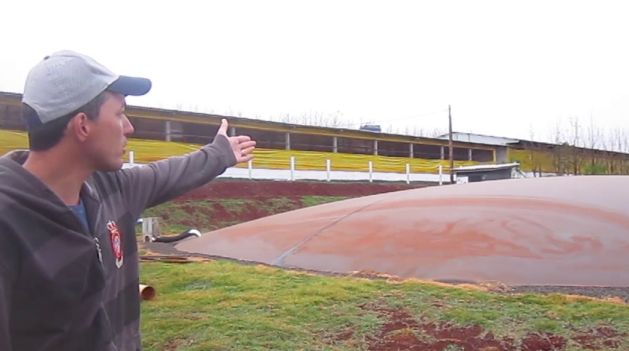Biogas Makes Pig Farming More Sustainable in Southern Brazil

ENTRE RIOS DO OESTE, Brasil, Sep 20 (IPS) - Biogas has the potential to provide 36 percent of the electricity consumed in Brazil or replace 70 percent of diesel if purified as biomethane, according to the Brazilian Association of Biogas and Biomethane (Abiogas).
This new source of energy is only recently gaining a foothold in this country, especially in the agricultural south. Its future is promising in an agro-diverse Brazil, which is the world's largest producer or exporter of sugar, coffee, meat and soybeans.
Its expansion also serves environmental purposes, reducing soil and water pollution from livestock excrement and waste and urban sewage.
Entre Rios do Oeste, a small town of 4,400 people and 155,000 pigs in the western part of the state of Paraná, inaugurated a mini biogas thermoelectric plant on Jul. 24.
It is the product of a pioneering agreement promoted by the International Centre for Renewable Energies-Biogas (CIBiogas), which involves the municipal government, 18 pig farmers and the Paraná Energy Company (Copel).
With a capacity of 480 kilowatts, the plant will enable the municipal government to save what it used to spend on electricity for its 72 buildings, including offices, schools and other services.
The 18 pig farms, with around 39,000 hogs, will produce the biogas that, through a 20-km network of pipes, will reach the plant.
Copel financed the project with 17 million reais (about 4.5 million dollars) and receives the electricity generated, with which the municipality pays its energy bill.
The project took 11 years to crystallise from the initial idea. It harnessed an earlier experiment - the Agroenergy Family Farming Condominium of the Ajuricaba River Basin, in the municipality of Cândido Rondon, 34 km northeast of Entre Rios.
The west of Paraná, where pig and poultry farming is intense, is experiencing a biogas production boom driven by CIBiogás, an association of international and national institutions founded in 2013 at the Technology Park of Itaipu, the giant hydroelectric plant shared by Brazil and Paraguay.
The Haacke Farm in the nearby municipality of Santa Helena uses chicken manure and devotes part of its biogas to produce biomethane, which it sells to Itaipu as fuel for the hydropower plant's vehicles.
Several companies already use biogas to generate their own electricity, such as Cerámica Stein, from Entre Rios.
BioKohler, a biodigester factory in the municipality of Cândido Rondon, is an example of the small industry and services that make up the local biogas economy. The Kohler family has also just installed its mini biogas thermoelectric plant, in partnership with a German company in the sector, Mele.
© Inter Press Service (2019) — All Rights Reserved. Original source: Inter Press Service
Where next?
Browse related news topics:
Read the latest news stories:
- While India's RAMSAR Sites Tally Rises, Wetlands Remain Endangered Wednesday, April 16, 2025
- Food Insecurity an Unprecedented Crisis Worldwide Wednesday, April 16, 2025
- The Long Goodbye: The Rise of Dementia Tuesday, April 15, 2025
- Standing Firm: Civil Society at the Forefront of the Climate Resistance Tuesday, April 15, 2025
- Genocide Prevention & Responsibility to Protect Tuesday, April 15, 2025
- Trump’s ‘Shock and Awe’ Tariffs Tuesday, April 15, 2025
- Is it Time to Say RIP to the SDGs? Tuesday, April 15, 2025
- World News in Brief: Relief supplies for Myanmar, invest in Haiti, child migrant deaths in Italy Tuesday, April 15, 2025
- Israeli strike on hospital ‘further cripples’ Gaza’s fragile health system Tuesday, April 15, 2025
- UN Youth Forum brings fresh perspectives on sustainable development Tuesday, April 15, 2025